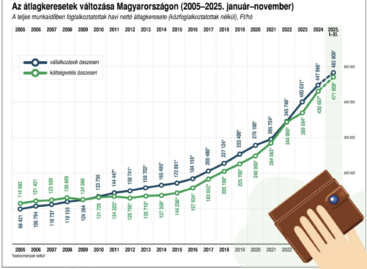GKI: How do domestic companies perform in terms of digitalization compared to their EU competitors?
Based on the past decades, it is clear that companies that quickly adapt to changes in the technological environment are competitive. The economic development of a country largely depends on the efficiency of the companies operating in its territory.
Corporate management systems facilitate the flow of information within the company, improve data quality, and greatly contribute to the efficient operation of companies. Similar solutions are used by 35% of Hungarian companies, compared to 43% in the EU. The difference is not explained by differences in average size: we are also lagging behind in the SME sector. Thus, the sectoral differences are probably lurking in the background.
Domestic companies still have room for improvement in terms of their online presence. While 32% of companies in the EU use at least two platforms supporting social access (e.g. a social network and a blog), only 17% of Hungarian companies do. In terms of the use of cloud-based services, we are in a better position, here we are only two percentage points behind the EU’s 39%.
Nothing shows the speed with which domestic companies adapt to new technological challenges than the willingness to introduce artificial intelligence, which has developed a lot in previous years. While by 2023, 8% of EU companies have already used some kind of AI-based solution, only 3.7% of domestic companies have used the opportunity. According to their own admission, Hungarian companies planning to introduce artificial intelligence typically do not use AI yet due to the lack of expertise and high expected costs, but an important inhibiting factor is the lack of compatibility with existing systems and the uncertainty of the legal background. Hungarian companies that do use artificial intelligence typically benefit from the new technology in the areas of marketing and sales, accounting and finance, and production.
Related news
KSH: the number of employed people was 4 million 624 thousand in December, the unemployment rate was 4.4 percent
🎧 Hallgasd a cikket: Lejátszás Szünet Folytatás Leállítás Nyelv: Auto…
Read more >In November, the gross average salary was 756,400 forints, which was 8.9 percent higher than a year earlier
🎧 Hallgasd a cikket: Lejátszás Szünet Folytatás Leállítás Nyelv: Auto…
Read more >KSH: industrial production fell by 5.4 percent in November compared to the same period of the previous year and by 2.0 percent compared to the previous month
🎧 Hallgasd a cikket: Lejátszás Szünet Folytatás Leállítás Nyelv: Auto…
Read more >Related news
“Proven recipes and new waves” – trade marketing in the coming years (online, free conference)
🎧 Hallgasd a cikket: Lejátszás Szünet Folytatás Leállítás Nyelv: Auto…
Read more >Hungarians view smart homes as an investment – MediaMarkt research
🎧 Hallgasd a cikket: Lejátszás Szünet Folytatás Leállítás Nyelv: Auto…
Read more >We gained 4,500 years back in six years – this is how Kifli.hu changed shopping
🎧 Hallgasd a cikket: Lejátszás Szünet Folytatás Leállítás Nyelv: Auto…
Read more >







